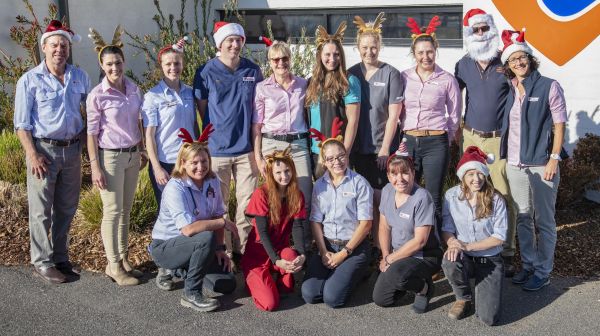|
We'd like to make sure your pet stays happy and healthy this silly season so here's a list of twelve potential pet hazards you need to watch out for this Christmas:
1. Christmas dinner and leftovers are too rich for our pets and can cause nasty tummy upsets and even pancreatitis. Stick to 'pet approved' treats.
2. Macadamia nuts are popular at Christmas and can be toxic for dogs leading to muscle weakness, vomiting and tremors.
3. Sultanas and raisins can cause kidney failure in dogs.
4. BBQ skewers can be catastrophic for pets so take care to ensure your pet doesn't accidentally ingest a skewer (which falls on the ground for example) and never feed your pet cooked bones - both can lead to the need for emergency intestinal surgery.
5. Chocolate - dogs can't metabolise the theobromine in chocolate and ingestion can lead to an increased heart rate, tremors, seizures and even death. The darker the chocolate the more toxic and the size of the dog and amount ingested also plays a part in the severity of the symptoms.
6. Decorations such as tinsel and fairy lights are very attractive to pets but can lead to a gastric obstruction if eaten.
7. Ribbons from presents are super attractive to cats and if ingested can lead to a nasty gastric obstruction requiring emergency surgery.
8. The Christmas tree might be an attractive indoor 'pee tree' but can also be a falling hazard.
9. Lots of guests can cause your pet to become stressed and even lead to them trying to escape - make sure they have a safe and quiet place to retreat to.
10. Christmas lilies can cause kidney failure in cats. The stamen, leaves and stems are all potentially toxic as is the water they are stored in so it's best not to have them in the first place.
11. Snakes are out and about and will be all summer so take care in long grass, around water or areas where there are rodents (grain sheds and chicken pens are common places.)
12. Heatstroke - never leave your pet in the car during the warmer weather, even on a mild day the temperature inside a car can reach dangerous levels in minutes. Leaving a window down will not help either so don't risk it!
If you have any questions about the health and safety of your pet, we are always here to put your mind at ease. Please ask us if you need any advice or information.
|
